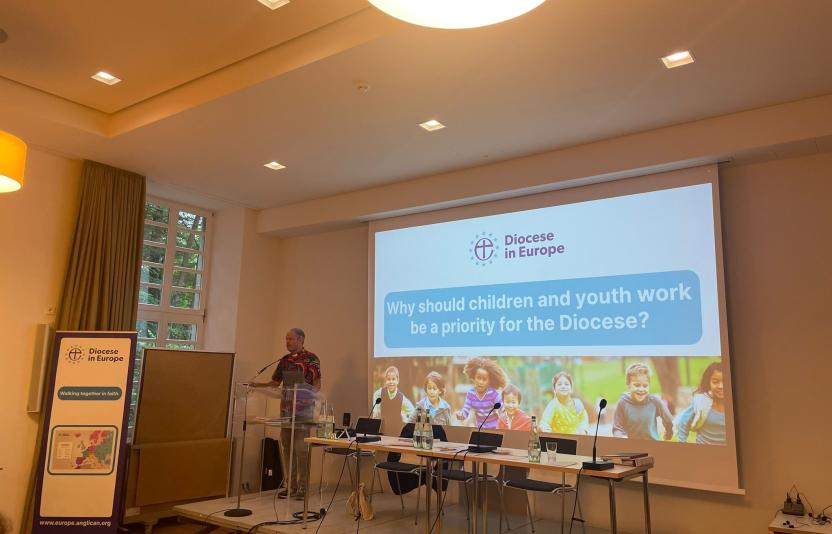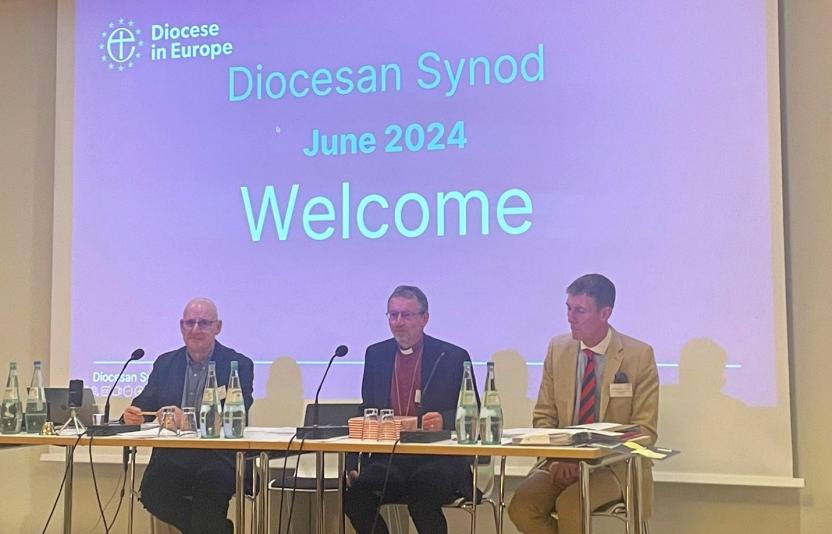General Synod session, February 2020
In this piece, General Synod member from the Diocese, Mary Talbot, reflects on shame, sorry, ‘we need to do much better’, togetherness, laughter, and daring to hope, across debates at its 10-13 February session in London:
General Synod has no over-arching theme. It deals with business over a broad spectrum. However, this was a session where members had to come to terms with how far and in how many areas the Church of England, of which Europe is a part, has failed to act as the Body of Christ and as a witness to the Kingdom of God and where several significant motions were passed to improve. Despite the sombre reality of a number of the issues discussed, at other times the wit and humour of many of the speakers brought us together in laughter. For many this was the end of a five-year period together. Overall, whether weeping or laughing, we seemed united, respectful of those with different views and of those who were hurting.
Windrush
This session recalled 1950 and the rejection by the Church of England of people because they were black, the shaming ongoing discrimination against BAME people and their lack of representation at many levels in the church’s hierarchy.
Safeguarding
The horror of the revelations in the IICSA report on the Peter Ball Case, the recognition that much more needed to be done, including greater accountability by clergy, and the final acceptance that apologies were not sufficient, but that financial redress was essential, together with on-going investigation, for which the Diocese in Europe has launched a further review into past cases.
Through His Poverty
A challenge to the orientation of much of the Church of England towards relatively affluent middle-class people, providing an insufficient welcome to the disadvantaged and marginalised, those whom Christ sought out. In all these areas, the Archbishop of Canterbury, along with others, spoke from the heart in expressing sorrow and shame for the church’s past and present failings and for the consistent message of a failure to be inclusive and welcoming to all children of God and sometimes even to notice that they are there.
Living in Love and Faith
The Living in Love and Faith project is not seeking to provide recommendations, but a suite of tools due to be released by July, which will help parishes and others explore together deeply complex questions and sharply divided opinions concerning human sexuality. Led by the Bishop of Coventry, a Pastoral Advisory Group (PAG) has brought together people from mixed backgrounds. It has produced six pastoral principles for its work. PAG members expressed their own experiences of the difficulties, tensions, near despair of working together but also the deep bonds, the worship and moments of epiphany which won through. Members from the floor of the Synod joined with their own stories. These resources will be rolled out to the dioceses later in the year to help us work together on these difficult issues.
Climate Change
Responding to a proposal to set a target date of 2045 to reach a zero carbon footprint, Synod upped the stakes by voting to bring this forward to 2030. Bishop Robert and other delegates voted in favour, although this will require increased ingenuity in reducing the need for air travel. As an Eco Diocese, we need to accelerate the move towards becoming eco-chaplaincies, for which A Rocha is a useful resource – see their website at https://www.arocha.org/
The National Church has published a piece on General Synod’s resolution on climate change: https://www.churchofengland.org/more/media-centre/news/general-synod-sets-2030-net-zero-carbon-target
Children and Youth Ministry
A scary analysis across the Church of England showed a significant drop in the attendance in church of children under 16. The need to learn from each other was stressed. In our dispersed Diocese, our on-line ‘Ministry for Young People’ tries to help address this. Support, particularly from those who already have a successful children’s and young people’s ministry is welcomed and will help others.
Clergy Well-being and Changes to Church Representation & Election Rules
A new covenant for clergy well-being outlines the roles of all, Bishops, clergy, lay in trying to ensure this happens.
Votes for elections can now be delivered by e-mail, something that Bishop Robert spoke in favour of and which will greatly facilitate the process in Europe and reduce costs. The restriction to a two-year consecutive term on Archdeaconry (Deanery) Synods has been reversed, unless voted for at Chaplaincy (Parish) level.
Amending the 1995 Diocese in Europe Constitution
Not of prime interest to other members of General Synod, this was not debated, but is deemed accepted. It was aired at length at the Diocese in Europe Synod. It aligns, as far as possible, the conditions for the Bishop to grant and remove licenses, and clergy retirement ages, with those in the rest of the Church of England. There are some exceptions, related to local legislation and UK Pension membership.
Hope …
Hope comes from the virtual unanimity of voting. But as the Bishop of Burnley warned, the transformation implied for all of us is massive. Pray for faith that ‘with God anything is possible.’
Further information:
The current members of General Synod for the Diocese are:
-House of Bishops: Bishop Robert
-House of Clergy (elected members): Debbie Flach, Tuomas Mäkipää, Giles Williams
-House of Laity (elected members): Tjeerd Bijl, David Coulston, Mary Talbot
We express grateful thanks to Mary for this article.
Diocesan General Synod members also produce a full report on each General Synod session item of business, which is provided to Diocesan, Archdeaconry and Deanery Synod representatives, for sharing in chaplaincies.


